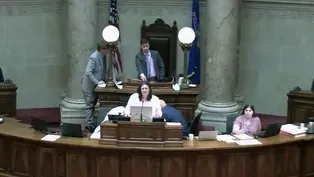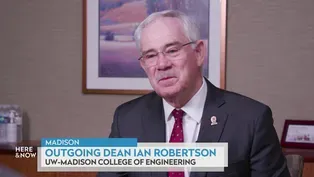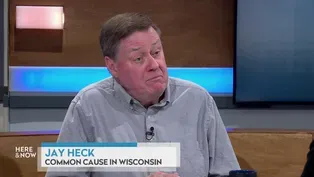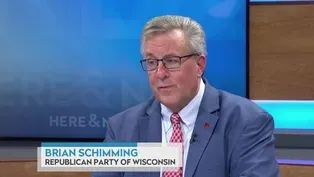Here and Now
Why Is Madison Considered a Climate Haven Going Forward?
Clip: Season 2200 Episode 2244 | 6m 52sVideo has Closed Captions
Madison and Wisconsin are increasingly touted as a refuge from impacts of climate change.
Madison, Wisconsin and the Great Lakes region are increasingly touted as a refuge from impacts of climate change, but extreme weather, housing shortages and other issues loom as more people move.
Problems with Closed Captions? Closed Captioning Feedback
Problems with Closed Captions? Closed Captioning Feedback
Here and Now is a local public television program presented by PBS Wisconsin
Here and Now
Why Is Madison Considered a Climate Haven Going Forward?
Clip: Season 2200 Episode 2244 | 6m 52sVideo has Closed Captions
Madison, Wisconsin and the Great Lakes region are increasingly touted as a refuge from impacts of climate change, but extreme weather, housing shortages and other issues loom as more people move.
Problems with Closed Captions? Closed Captioning Feedback
How to Watch Here and Now
Here and Now is available to stream on pbs.org and the free PBS App, available on iPhone, Apple TV, Android TV, Android smartphones, Amazon Fire TV, Amazon Fire Tablet, Roku, Samsung Smart TV, and Vizio.
Providing Support for PBS.org
Learn Moreabout PBS online sponsorshipvery much.
>> Environmental news, smoke from Canadian wildfires drifted down into Wisconsin this week, putting Eau Claire and Marathon counties under unhealthy air quality advisories, droughts, fires, heavy storms and flooding are a daily reminder of how climate change impacts people's lives and where they decide to live.
Select cities like Madison have been deemed climate havens because it's believed they'll see less intense effects of climate change.
Here and now.
Next generation intern Hannah Ritvo has this story.
>> The August that we left, it was so dry and so hot that there were wildfires.
Actually encroaching on Austin as we were leaving, as we were driving down the highway, it was literally just scorched black earth.
>> Jessica Mederson left Texas 12 years ago to escape the heat.
>> Everybody in the world wants to be in Austin and I loved it a lot.
But I hated the heat.
>> Mederson is among many who have left their homes to adapt to a changing climate.
Over 3 million Americans have already moved due to climate change.
>> If you look at the US alone last year there had been $1 billion weather disasters almost every two weeks on average.
>> Some of these migrants could be headed to places called climate havens.
>> A climate haven is the idea of a place that's a refuge or a safe spot from the impacts of climate change.
>> Madison is routinely cited as one of six climate havens around the United States.
>> It's been hypothesized that this area of the country could be a climate haven, because it might escape the worst of climate change impacts.
>> Steve Vavrus is the state climatologist and co-director of the Wisconsin Initiative on Climate Change Impacts.
what we don't have.
We don't have hurricanes.
We don't have big wildfires, and we're far away from sea level rise.
So the combination of those things has made a lot of people speculate that our region of the country could be very attractive to so-called climate migrants, but it's not all sunshine and rainbows.
>> Vavrus says potential climate migrants should be aware of Madison's own increasing climate extremes.
>> We get a lot of heavy rainfalls, we get a lot of flooding.
We often get heat waves, too, that are hot and humid and then last summer we had so much wildfire smoke and that caught people off guard.
>> The 20 tens were Wisconsin's wettest decade on record by far.
>> We had a lot of flooding events across the state in that decade, and one of the worst, maybe the worst in that decade was in 2018.
In August in Dane County, where just about a foot of rain fell in 24 hours, which was a statewide record.
And it's an incredible amount of rain.
It's more like Hurricane amounts, and it certainly caused terrible flooding.
It even caused one fatality, he says.
>> The concept of climate havens started about six years ago.
>> This is something that I don't think scientists anticipated would would draw so much public interest.
It's something that that was really kind of a groundswell of interest from the masses.
And that's caught the attention of a lot of climatologists.
>> And it's a debated notion because there are many reasons that people move the cost of living, the quality of education , the availability of housing.
>> This is a big issue in Madison with high house prices an d rents, and not everyone can escape disaster.
>> There are communities who are unable to move due to poverty or social norms, or disability or age.
We have a history of locating polluting industries in low income and minority communities.
The environmental justice movement started as a result of that.
So these are the same communities that are disproportionately affected by climate change.
executive director of the Human rights program at UW-Madison >> I look at the link between human rights and environmental issues, especially climate change, Atapattu says.
>> There is anecdotal evidence that individuals are moving to Madison due to the impacts of climate change, but not enough data yet to truly know.
Nonetheless, climate migration is already happening around the world.
relocated as we speak.
Some communities are awaiting relocation in, and people are moving, she says.
>> Climate change is a global problem with local impacts.
>> It's important for us to realize that the decisions we take will have repercussions.
Thousands of miles away, small island states and people who are living there, they will be the ground zero of climate change because they might lose everything they have, including their country.
So we don't really know where those people will go and what will happen to those countries.
>> Atapattu says.
The most important thing we can do is educate ourselves and prepare sufficiently for disasters and migration.
And cities, especially those deemed climate havens, must be ready to accommodate an influx of potential climate migrants.
Experts estimate more than 1 billion people could be displaced in the next 25 years due to changing weather.
>> Can their infrastructure handle a lot more people?
These are things that communities need to be thinking about anyway.
>> Some cities have already begun promoting themselves as climate havens.
>> Lake superior big enough for everyone.
>> Buffalo and Duluth are two communities that have gone all in with advertising and encouraging people to come to their communities, and hopefully they have the ability to take in a lot of residents fairly quickly.
>> Madison hasn't promoted itself that way, but Vavrus says it is important the city gets ready for potential climate migrants, as it's clear the Midwest may be more immune to severe climate impacts than other regions.
>> But again, people need to recognize that we've got our own challenges when it comes to climate and extreme weather here, too, that there's really no safe place from the impacts of climate change.
>> For "Here& Now" I'm Hannah Ritvo in Madison.
>> Hannah Ritvo is graduating from Umms Madison and completes her work with Here and Now this
Here & Now opening for May 17, 2024
Video has Closed Captions
The introduction to the May 17, 2024 episode of Here & Now. (1m 14s)
Ian Robertson on Goals of UW-Madison Engineering Education
Video has Closed Captions
Ian Robertson on the UW-Madison engineering program's efforts to train more students. (4m 50s)
Jay Heck on Ballot Drop Boxes and Wisconsin Voters in 2024
Video has Closed Captions
Jay Heck on a lawsuit that seeks to reverse an order barring absentee ballot drop boxes. (6m 22s)
Brian Schimming on Wisconsin Voters and Republicans in 2024
Video has Closed Captions
Brian Schimming on Wisconsin's importance in the 2024 election and turning out voters. (9m 21s)
Providing Support for PBS.org
Learn Moreabout PBS online sponsorshipSupport for PBS provided by:
Here and Now is a local public television program presented by PBS Wisconsin















